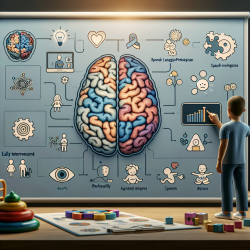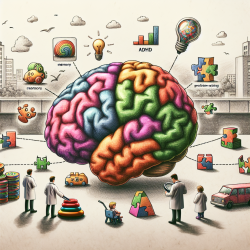Autism Spectrum Disorder (ASD) is a complex neurodevelopmental condition characterized by deficits in social communication and restrictive, repetitive behaviors. A recent study titled "Autism Spectrum Disorder in Children with an Early History of Paediatric Acquired Brain Injury" (Porter et al., 2023) has highlighted the potential link between early pediatric acquired brain injury (ABI) and ASD. The study's findings suggest that early ABI may be a risk factor for ASD, and it also emphasizes the need for early screening and intervention. Here, we explore the key takeaways from this research and provide actionable insights for practitioners.
Key Findings from the Study
The study reviewed hospital records from The Brain Injury Service, Kids Rehab at the Children’s Hospital at Westmead, Australia, covering a period from January 2000 to January 2020. Among the approximately 528 cases of pediatric ABI, 14 children (2.7%) were subsequently diagnosed with ASD. Notably, the mean age at the time of ABI was 1.55 years, and the mean age of ASD diagnosis was significantly delayed compared to the general population. Key findings include:
- High prevalence of comorbidities: 100% of children had at least one medical comorbidity, and 73% had three or more co-occurring DSM-5 diagnoses.
- Delayed ASD diagnosis: On average, ASD diagnosis was delayed by about five years compared to the general population.
- Early ABI as a potential risk factor: The study suggests that early ABI may contribute to the development of ASD, possibly due to shared neurobiological mechanisms and the impact on brain regions involved in social cognition.
Clinical Implications
The findings have significant implications for clinical practice:
- Early Screening: Given the potential for delayed ASD diagnosis following early ABI, practitioners should consider early screening for ASD symptomatology in children who have sustained an ABI. This can help in timely identification and intervention.
- Comprehensive Assessment: Practitioners should conduct thorough assessments that consider the possibility of ASD, especially in children with multiple comorbidities. This includes using standardized diagnostic tools like the Autism Diagnostic Observation Schedule (ADOS).
- Integrated Care: An integrated approach involving multidisciplinary teams (including speech therapists, occupational therapists, and psychologists) is crucial for managing the complex needs of children with co-occurring ABI and ASD.
Encouraging Further Research
While the study provides valuable insights, it also highlights the need for further research. Practitioners are encouraged to:
- Participate in Longitudinal Studies: Longitudinal research is needed to better understand the long-term outcomes of children with early ABI and the efficacy of early screening and intervention for ASD.
- Investigate Neurobiological Mechanisms: More research is required to elucidate the shared neurobiological mechanisms between ABI and ASD, which can inform targeted therapeutic strategies.
Conclusion
The link between early pediatric ABI and ASD underscores the importance of early screening, comprehensive assessment, and integrated care. By implementing these strategies, practitioners can improve outcomes for children at risk of developing ASD following an ABI. To read the original research paper, please follow this link:
Autism Spectrum Disorder in Children with an Early History of Paediatric Acquired Brain Injury.










